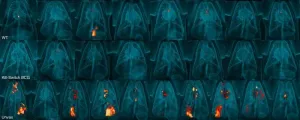(Press-News.org) PITTSBURGH, Jan. 10, 2025 – A self-destructing vaccine administered intravenously provides additional safety and protection against tuberculosis (TB) in macaque monkeys, suggests new University of Pittsburgh research published today in Nature Microbiology.
The in-built safety mechanisms circumvent the possibility of an accidental self-infection with weakened mycobacteria, offering a safe and effective way to combat the disease that was named as the deadliest of 2024 by the World Health Organization.
“Although the idea of intravenous vaccination with a live vaccine may sound scary, it was very effective in our previous studies in non-human primates. Here, we focused on the safety aspect of IV vaccination and used a strain of mycobacteria that kills itself once administered to the animals. To our surprise, it was equal or slightly better than the regular TB vaccine in protecting monkeys against infection, providing sterilizing immunity in almost all animals,” said JoAnne Flynn, Ph.D., distinguished professor and chair of microbiology and molecular genetics at Pitt. “The live-attenuated form of the mycobacteria does not need to be alive for very long to provide outstanding protection and with this strain there is essentially no chance for a vaccine-derived infection, even in an immunocompromised host.”
Despite the ongoing global public health burden of TB, safe and effective protection strategies against the infection are lacking. Bacillus Calmette-Guérin (BCG) vaccine – named for its developers – contains inactivated mycobacteria that infect cattle and remains the only vaccination strategy against the infection in humans. Injected into the skin, it provides only partial protection against TB in young children and no protection in adults.
To develop a more universally effective vaccination approach, Flynn partnered with colleagues at Cornell University. In Flynn’s earlier work in macaque monkeys with collaborators at the National Institutes of Health, researchers saw a 100,000-fold reduction in bacterial burden in the lungs of animals who were given the BCG vaccine intravenously compared with the standard intradermal route. Nine out of 10 animals showed no inflammation in their lungs.
To improve the safety of IV BCG delivery in the new study, researchers engineered two built-in mechanisms that instruct the BCG particles to dissolve either upon exposure to the antibiotic doxycycline or when chronic doxycycline treatment is stopped. Mouse experiments showed that the BCG vaccine containing this dual safety switch protects the animals against TB comparable to a standard BCG vaccination but has the added benefit of faster elimination and safety, even for mice that were immunocompromised.
In macaque monkeys, the updated self-destructing BCG vaccine caused an even stronger immune response and better protection against TB than a standard IV BCG injection. None of the monkeys that received the updated BCG vaccine had any detectable level of lung inflammation eight weeks after being infected with live Mycobacterium tuberculosis. In addition, six out of eight monkeys had no traces of recoverable live M. tuberculosis compared to two out of eight monkeys that received the standard BCG intravenously.
Despite the additional challenges of clinical testing required for expanding the use of the updated BCG vaccine in humans, researchers are optimistic.
“We hope that this ‘kill switch’ BCG strain could limit safety concerns over intravenous vaccine administration and provide an option for a safer and more effective vaccination route for individuals who are immunocompromised,” Flynn said.
The other senior authors of this research are Dirk Schnappinger, Ph.D., and Sabine Ehrt, Ph.D. of Weill Cornell Medicine. Other authors of this research are Alexander Smith, Ph.D., Pauline Maiello, M.S., H. Jacob Borish, Ph.D., Caylin Winchell, Ph.D., Andrew Simonson, Ph.D., Philana Ling Lin, M.D., Mark Rodgers, M.S., Daniel Fillmore and Jennifer Sakal, all of Pitt; and Hongwei Su, Ph.D., Joshua Wallach, Yao Liu, Ph.D., Kan Lin, Ph.D., Valerie Vinette, Ph.D., all of Weill Cornell Medicine.
END
Self-destructing vaccine offers enhanced protection against tuberculosis in monkeys
2025-01-10
ELSE PRESS RELEASES FROM THIS DATE:
Feeding your good gut bacteria through fiber in diet may boost body against infections
2025-01-10
The group of bacteria called Enterobacteriaceae, including Klebsiella pneumoniae, Shigella, E.coli and others, is present at low levels as part of a healthy human gut microbiome. But at high levels - caused for example by increased inflammation in the body, or by eating contaminated food - these bugs can cause illness and disease. In extreme cases, too much Enterobacteriaceae in the gut can be life-threatening.
Researchers have used computational approaches including AI to analyse the gut microbiome composition of over 12,000 people across 45 countries from their stool samples. They found that a person’s microbiome ‘signature’ can predict ...
Sustainable building components create a good indoor climate
2025-01-10
Whether it’s the meeting room of an office building, the exhibition room of a museum or the waiting area of a government office, many people gather in such places, and quickly the air becomes thick. This is partly due to the increased humidity. Ventilation systems are commonly used in office and administrative buildings to dehumidify rooms and ensure a comfortable atmosphere. Mechanical dehumidification works reliably, but it costs energy and – depending on the electricity used – has a negative climate impact.
Against this backdrop, a team of researchers from ETH Zurich investigated a new approach to passive dehumidification of indoor spaces. Passive, in this context, means ...
High levels of disordered eating among young people linked to brain differences
2025-01-10
More than half of 23-year-olds in a European study show restrictive, emotional or uncontrolled eating behaviours, according to new research led by the Institute of Psychiatry, Psychology & Neuroscience (IoPPN) at King’s College London. Structural brain differences appear to play a role in the development of these eating habits.
The study, published in Nature Mental Health, investigates the links between genetics, brain structure and disordered eating behaviours in young people. Researchers found that the process of ‘brain maturation’, ...
Hydrogen peroxide and the mystery of fruit ripening: ‘Signal messengers’ in plants
2025-01-10
A research team led by Prof. QIN Guozheng from the Institute of Botany of the Chinese Academy of Sciences has unveiled a previously unrecognized mechanism by which the RNA N6–methyladenosine (m6A) demethylase SlALKBH2 undergoes reduction-oxidation (redox) modification. This alteration affects its stability and its physiological role in regulating the normal ripening of tomato fruits.
In this study, published in Nature Plants, the researchers deepened their understanding of the role of hydrogen peroxide ...
T cells’ capability to fully prevent acute viral infections opens new avenues for vaccine development
2025-01-10
T cells can independently prevent acute viral infections to an extent previously thought only possible with neutralising antibodies.
Findings challenge the longstanding reliance on neutralising antibodies for assessing viral immunity, and suggest that development of future vaccines must consider both antibody and T-cell responses for comprehensive protection.
Singapore, 10 January 2025—Scientists from Duke-NUS Medical School and the Singapore General Hospital have discovered that T cells—white blood cells that can destroy harmful pathogens—can completely prevent viral infection, to an extent ...
Study suggests that magma composition drives volcanic tremor
2025-01-10
A new study based on the sampling and analysis of volcanic ash at Cumbre Vieja volcano in the Canary Islands, located off Africa’s northwest coast, suggests that the composition of magma could drive tremors during volcanic eruptions. The findings, which are detailed today in the journal Nature Geoscience in a paper led by scientists at the American Museum of Natural History and the City University of New York (CUNY), highlight the potential of volcanic ash analysis as a monitoring and forecasting tool.
“The volcano research community has gotten ...
Sea surface temperatures and deeper water temperatures reached a new record high in 2024
2025-01-10
A new study published in Advances in Atmospheric Sciences has found that ocean warming in 2024 has led to new record high temperatures. The ocean is the hottest it has ever been recorded by humans, not only at the surface temperature but also for the upper 2000 meters.
“The broken records in the ocean have become a broken record.” Said Prof. Lijing Cheng with the Institute of Atmospheric Physics at the Chinese Academy of Sciences. He led a team of 54 scientists from 7 countries and discussed how ...
Connecting through culture: Understanding its relevance in intercultural lingua franca communication
2025-01-10
In today’s world, telecommunications and global connectivity have witnessed an unprecedented increase, making intercultural communication an unavoidable reality. A concerning aspect of such communication is the element of cultural and linguistic diversity between people. However, there is very little consensus on whether cultural diversity truly matters in intercultural communications or if it simply promotes miscommunication.
“In academic literature, culture tends to be approached in a dichotomous stance, either through a lens of miscommunication or is considered an altogether irrelevant construct when it ...
Men more than three times as likely to die from a brain injury, new US study shows
2025-01-10
A new analysis of U.S. mortality data reveals the disproportionate impact of traumatic brain injuries (TBI) on older adults, males and certain racial and ethnic groups.
The study, published in the peer-reviewed journal Brain Injury, provides a comprehensive analysis of TBI-related deaths across different population groups across the U.S. in 2021.
The findings indicate that suicides remain the most common cause of TBI-related deaths, followed by unintentional falls, and specific groups are disproportionately affected by these tragedies.
Men, in particular, were found to be most likely to die from a TBI – more than three times ...
Tongue cancer organoids reveal secrets of chemotherapy resistance
2025-01-10
Oral cancer is an increasingly prevalent disease worldwide, with over 300,000 new cases diagnosed each year. Among oral cancers, tongue cancer (TC) is the most common type and often carries a poor prognosis. Surgery combined with chemoradiotherapy is one of the main lines of treatment for high-risk cases of TC. However, recurrence rates are high since the tumors can reestablish themselves from only a few surviving cells. A few surviving cells are referred to as minimal residual disease (MRD).
Understanding the mechanisms behind MRD formation is paramount to improving treatment outcomes ...









